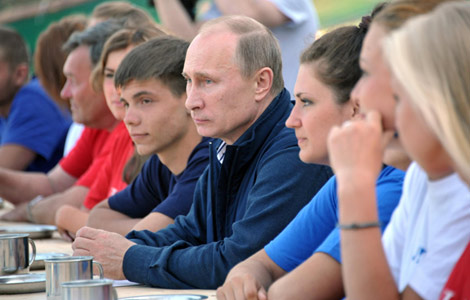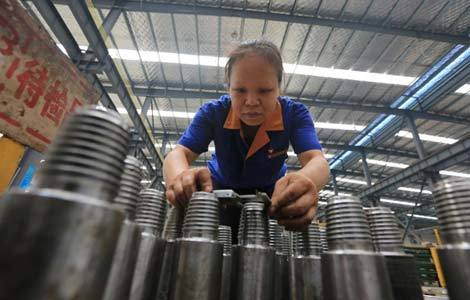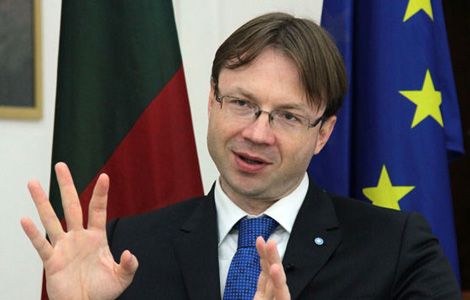Investing abroad not easy: Experts
Updated: 2013-07-16 07:13
By Du Juan (China Daily)
|
||||||||

As Chinese steel firms step up their efforts to explore resources abroad, there have been ups and downs in their gains because of inexperienced risk management, reports Du Juan in Perth, Australia
Facing increasing domestic demand for iron ore with high import prices in recent years, Chinese steel companies have been trying to find an effective investment model to make acquisitions cheaper and more predictable.
They have made moves into Australia, Brazil and Africa, where the resource is found in abundance but some projects have had to be suspended because of various political, financial or environmental reasons while others have been relatively successful.
Industry insiders and experts said it is currently better for Chinese steel companies to find a local partner familiar with the business in the region than invest huge amounts of money buying up a site entirely on its own to exploit.
"It is all about balance," said Sebastian Lewis, editorial director of Platts China, the commodities information provider.
If a Chinese steel company takes a minority stake in a foreign mining company, it can help secure the iron ore supply although the Chinese entity would not be involved in the management, he said.
"In the case of direct investment, you (Chinese steel companies) own more of the project, which may bring you higher returns during the operation, but it also brings risks because the construction period can be very challenging in terms of managing the project outside your own country and constructing the infrastructure," Lewis added.
"Neither way is necessarily good or bad. It depends on your tolerance of risk."
China's largest and most ambitious overseas investment in the mining industry is the Sino Iron project wholly owned by CITIC Pacific Ltd, a Hong Kong-listed incorporated company.
CITIC Pacific secured the rights to 2 billion metric tons of magnetite resources with an expected mine life of 25 years in 2006. Last year, the company announced that it had acquired a further 1 billion tons of magnetite ore.
The project was expected to have an investment scale of $4.2 billion and was put into operation in the first half of 2009. However, because of rising costs and various misfortunes, the commissioning date has been delayed several times.
According to a source within the company, the total investment will increase to about $8 billion.
However, the source said the operation of the project is not as bad as some say and the second and third phrases of the project will be completed on schedule.
Although many Chinese companies have been facing challenges, including financial pressure, unfamiliar laws and regulations, environmental and labor issues, they are also making progress and gaining experiences.
"It is difficult for any company to go overseas at the beginning," said Lewis. "If they just want to secure raw material supplies, it is probably better just to buy shares in these iron ore companies."
Zhang Tieshan, an analyst from steel information provider Mysteel.com, shared that opinion.
"It is hard for Chinese companies to make decisions if they have total control of mining companies abroad," he said. "They may have good intentions but always face objections and suspicion if they want to hold the majority of the shares."
For instance, Shougang Group's project in Peru encountered strikes by staff that reflected badly on the company.
"It can be less risky if Chinese steel companies buy shares, which is similar to having a long-term iron ore supply contract," said Zhang.
Hunan Valin Iron and Steel Group Co invested in Australia-based iron ore company Fortescue Metals Group Ltd in 2009, becoming the second-largest stakeholder with a current share of 14.72 percent of the shares. It is considered to be a success by Li Jianguo, general manager of Valin.
He said the key factor behind its success was not interfering with Fortescue's production operations and letting a local team manage its business through major shareholder discussion and participation in board meetings.
"It is proven that this is an effective way to manage overseas investments," Li said. "Valin has received positive financial returns on this investment."
Questioned whether Valin had any influence on Fortescue's iron ore prices and had no say regarding them, Li said the company's investment was to gain positive returns rather than getting below-market prices for iron ore products.
"Iron ore prices depend on supply and demand. Return on industry investment is realized by real market prices through low production costs and product sales."
Although many steel companies have secured iron ore supplies by investing abroad, Zhang said now is not a good time for overseas mergers and acquisitions, buying exploration rights or purchasing land because costs are currently high.
"Iron ore prices will continue to fall. It would be better to consider any possible investment after they fall even further," said Zhang.
China imported 384.29 million tons of iron ore in total in the first half of this year, up 5.1 percent year-on-year, according to the General Administration of Customs.
The average imported iron ore price during the first half was $133.2 a ton, down $6.30 compared with the same period last year.
The average imported iron ore price in June was $126.8 a ton, a $12 drop compared with May's figure.
The iron ore market in the first half was weaker than in the same period last year. The cost of China's iron ore imports for the first half totaled $51.2 billion, a slight increase of 0.3 percent year-on-year.
Cooperation
Valin's Li said its investment has promoted strategic cooperation between Fortescue and other Chinese enterprises.
Up to 50 percent of Fortescue's capital goods - valued at $2 billion - were sourced from China, said Neville Power, Fortescue Mining Group's chief executive officer.
"We believe the number will grow in the future," said Power.
The company's trains used for iron ore transportation from the processing plants to the port are made by two top train producers in China - CSR Corp Ltd and CNR Corp Ltd.
China International Marine Containers Group Ltd provides dormitories in miners' camps for company staff.
China's Fujian Haian Rubber Co Ltd is the supplier of tires for some heavy mining trucks used by Fortescue.
Because of the high standards required for such tires, which can be used in extreme weather and harsh geographic conditions, there are not many producers in the world. China hasn't exported these products before.
Haian Rubber was the first producer of such tires in China and the fourth in the world - the other three being in Japan, the United States and France.
For Chinese suppliers, making their presence known on the international market is more significant than making money. The mining giants usually get a good deal, which is a win-win situation.
Last June, Rio Tinto, another Australian mining company, bought custom-built trucks from Xiangtan Electric Manufacturing Corp, a manufacturer based in Xiangtan, a city in Hunan province. It was the first time the Chinese company had exported trucks and was a large step forward in its expansion into overseas markets.
According to the company, it spent $2 billion in 2012 in the Chinese market, $800 million more than the previous year.
Mark Rivers, general manager of emerging markets procurement for Rio Tinto, told China Daily the company was not only purchasing trucks but also looking for Chinese suppliers of other mining equipment with advanced technology.
He said he believes the high-technology equipment market in China will grow rapidly over the next decade.
See more at http://www.chinadaily.com.cn/business/
Contact the writer at dujuan@chinadaily.com.cn
(China Daily 07/16/2013 page13)

 Obama urges restraint amid protests
Obama urges restraint amid protests
 Putin wants Snowden to go, but asylum not ruled out
Putin wants Snowden to go, but asylum not ruled out
 Apple to probe death of Chinese using charging iPhone
Apple to probe death of Chinese using charging iPhone
 Investment falters as industrial activity flags
Investment falters as industrial activity flags
 Rape victim's mother wins appeal
Rape victim's mother wins appeal
 Reproduction of 'Sunflowers' displayed in HK
Reproduction of 'Sunflowers' displayed in HK
 Land Rover enthusiasts tour the world
Land Rover enthusiasts tour the world
 US star sprinter fails drug test
US star sprinter fails drug test
Most Viewed
Editor's Picks

|

|

|

|

|

|
Today's Top News
Spain apologizes to Bolivia for plane delay
International cotton contract in the works
Smithfield shareholder still presses for break up
China calls for new talks on Iran nuclear issue
Global warming may largely raises sea level
Putin wants Snowden to go, asylum not ruled out
US: China can balance own growth
Top foreign study destinations for Chinese
US Weekly

|

|






